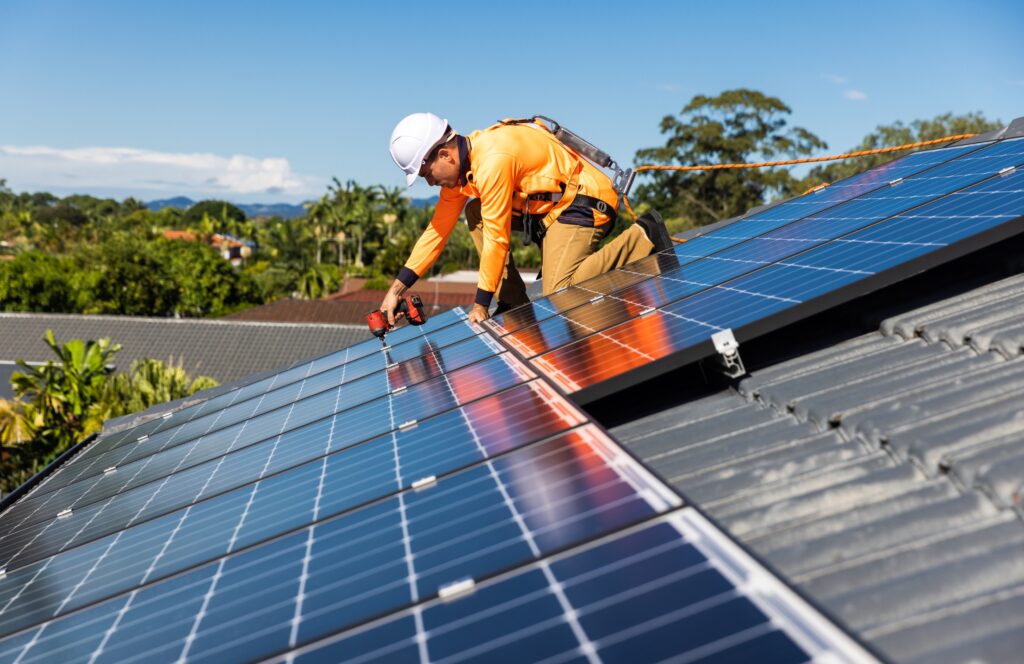Electric Buildings Could Save Inland Empire Billions: 62% of Californians Back SB 1221 for Affordable Neighborhood Clean Energy Upgrades
3 min read
A contractor installing solar panels onto the roof of a home in Southern California.
A groundbreaking analysis released last week by the Natural Resources Defense Council (NRDC) and Energy + Environmental Economics (E3) reveals that strategic electrification projects in California, including the Inland Empire, could save gas utility customers $20 billion by 2045. The report emphasizes that replacing aging gas pipelines with electrification programs could cut annual utility costs significantly, benefiting Inland Empire residents.
The California Energy Commission warns that without intervention, gas bills could soar to $600 per month by 2050 due to the steep costs of maintaining outdated gas infrastructure. The NRDC and E3 report estimates that California gas utilities plan to replace 8,900 miles of gas distribution lines by 2045 at a staggering cost of $43 billion. Instead, the report suggests a geographically-targeted electrification initiative that would power entire neighborhoods with clean energy, offering households zero-emission appliances like heat pumps. This approach is projected to cost half as much as gas pipeline investments, saving customers money while enhancing air quality, climate resilience, and community affordability.
Switching from gas would also cut climate emissions and protect public health. The building sector in California, generates about 25% of the state’s greenhouse gasses, equivalent to emissions from nearly 10 million vehicles. Gas-burning appliances in homes emit four times more nitrogen oxide (NOx) pollution than the state’s gas power plants, contributing to respiratory and cardiovascular issues, lower birth weight in newborns, and increased hospital visits.
Despite these findings, California continues investing heavily in new gas infrastructure, undermining its net-zero emissions goal by 2045. The state is the second-largest consumer of natural gas in the country, even though demand is declining. Gas infrastructure projects can take decades to complete, and pipelines can last up to 80 years, locking utility customers into costly, outdated systems. Notably, California has some of the oldest gas infrastructure in the nation, meaning decisions made today will have long-lasting impacts on the climate and clean energy future.
However, the state is pursuing solutions that could benefit both the climate and ratepayers. Senate Bill 1221 (Min) is moving through the state legislature and would enable regulators and utilities to launch targeted electrification pilot projects. These projects aim to reduce costs and emissions by shifting to clean energy infrastructure. Similar initiatives are being explored in Colorado, Illinois, and New York.
“It’s time to make smarter decisions around energy infrastructure and invest in a way that makes energy more affordable for Californians while also driving progress towards our 2045 zero carbon goals,” said bill author Senator Dave Min (D-Irvine). “SB 1221 paves the way for this transition by showing how we can move away from fossil fuels in heating and cooling our homes, driving down utility costs for consumers, and building climate resilience.”
A new poll by FM3 for the Building Decarbonization Coalition (BDC) shows that 62% of California voters support upgrading their neighborhoods to run on 100% clean electricity. Affordability is a key issue, with more than three in five respondents concerned about the high costs of maintaining or replacing aging gas pipelines.
With SB 1221, Inland Empire residents could experience neighborhood-scale decarbonization, long-term energy affordability, and healthier communities powered by renewable energy. This legislative move represents a critical opportunity for the region to lead in sustainable, cost-effective energy solutions.
For more information on the potential impacts of electrification in the Inland Empire, visit the NRDC and E3 websites or contact local energy advocates.





